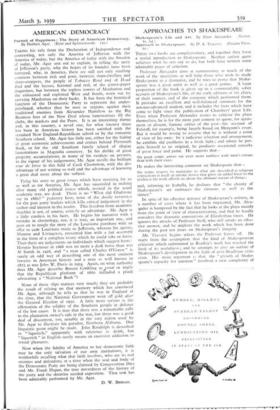AMERICAN DEMOCRACY
Pursuit of Happiness : The Story of American Democracy. By Herbert Agar. (Eyre and Spottiswoode. r5s.)
TAKING his title from the Declaration of Independence and contrasting, not only the America of Jefferson with the America of today, but the America of today with the Sweden of today, Mr. Agar sets out to explain, in telling the story of Jefferson's party, why the hopes of its founder have been betrayed, why, in America, there are still not only startling contrasts between rich and poor, between slum-dwellers and share-croppers, the people of Tobacco Road and of Dead End and the heroes, fictional and real, of the glossy-paper magazines, but between the topless towers of Manhattan and the exhausted and exploited West and South, worn out by carrying Manhattan on their backs. It has been the historical function of the Democratic Party to represent the under- privileged, whether they be men or regions, against their traditional enemies from Alexander Hamilton to the Big Business foes of the New Deal whose lamentations fill the clubs, the markets and the Press. It is an interesting theme and, in this country, a novel one, for what interest there has been in American history has been satisfied with the standard New England-Republican school or by the romantic Southern school. Mr. Agar has little use, either for the hiding of great economic achievements and crimes behind Plymouth Rock, or for the old Southern family school of elegiac
lamentations in Magnolia cemetery. In his dislike of great property accumulations, in many of his verdicts on persons,
in the vigour of his judgements, Mr. Agar recalls the brilliant tour de force in this field of Cecil Chesterton, with the dis- advantage of not writing so well and the advantage of knowing a great deal more about the subject.
Tying his story to great issues which have meaning for us as well as for America, Mr. Agar has succeeded in making alive many old political issues which, treated in the usual academic way, are dead. There is no " What did Gladstone say in 1882? " pedantry here, none of the docile reverence for the past party leaders which kills critical judgement in the author and interest in the reader. This freedom from academic shackles is not, of course, entirely an advantage. Mr. Agar is a little careless in his facts. He begins his narrative with a mistake in chronology, not, it is true, an important one, and goes on to tangle the story of the Louisiana purchase with an offer to cede Louisiana made to Jefferson, whereas his agents, Monroe and Livingston, presented him with a fait accompli in the form of a complete treaty which he could take or leave. Then there are judgements on individuals which suggest haste: Horatio Seymour in 1868 was no more a dark horse than was Al Smith in 1928, and " a man called Charles O'Conor " is surely an odd way of describing one of the most eminent lawyers in American history and a man as well known in 1872 as was John W. Davis in 1924. Again, on what authority does Mr. Agar describe Roscoe Conkling as venal or imply that the Republican platform of 186o included a plank advocating a " National Bank "?
None of these slips matters very much; they are probably the result of relying on that memory which has convinced Mr. Agar, although he tells us that he was in England at the time, that the National Government went off gold after the General Election of 1931. A little more serious is the affirmation of the solidity of the Southern people in defence of the lost cause. It is true that there was a remarkable rally to the plantation owner's side in the war, but there was a good deal of discontent, too, notably in the very region used by Mr. Agar to illustrate his paradox, Northern Alabama. One linguistic point might be made. John Randolph is described as " liquorish," apparently with reference to drink, but " liquorish " in English surely means an excessive addiction to sexual pleasures.
Now when the fidelity of America to her democratic faith may be the only salvation of our own institutions, it is worthwhile recalling what that faith involves, who are its real enemies and defenders; at a time when the soul and body of the Democratic Party are being claimed by Congressman Dies and Mr. Frank Hague, the true inwardness of the history of the party and the doctrine needed exposition. That task has been admirably performed by Mr. Agar.
D. W. BROGAN.


























































 Previous page
Previous page